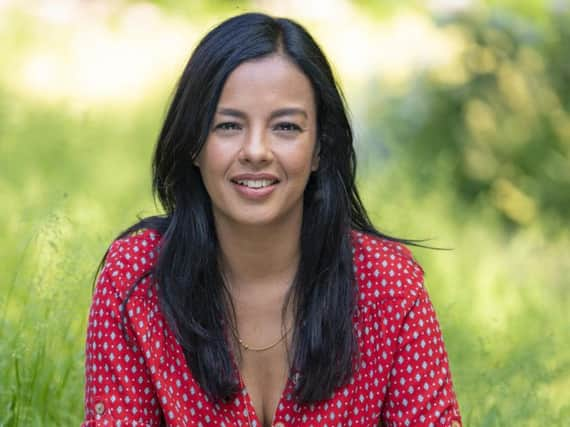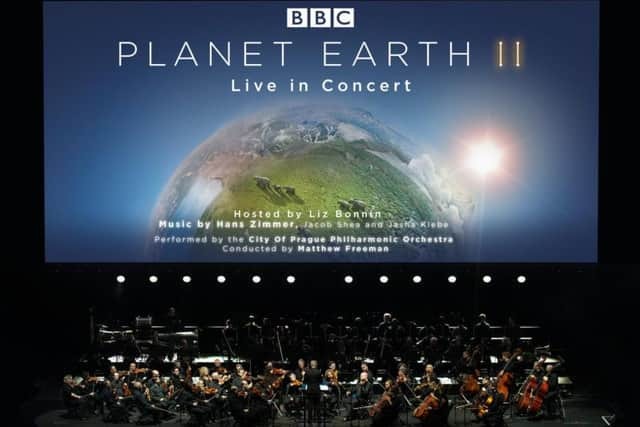Liz Bonnin on the inspirational David Attenborough and why we can all play our part in tackling climate change


In the 2018 BBC documentary Drowning In Plastic, the wildlife biologist investigated the devastating impact of plastic on our oceans and marine wildlife, and what we are doing to tackle it.
The global scale of the pollution in the sea was shocking and some of the sights, like that of flesh-footed shearwater chicks, newly emerged from their burrows, unable to make it past the surf because they were weighed down with plastic, were harrowing to watch.
Advertisement
Hide AdAdvertisement
Hide AdIf that was a rallying cry then the BBC documentary Meat: A Threat To Our Planet? was more contentious. In the 60-minute film, Bonnin learned about the growth of the meat industry, and some of the predictions of its effect on our planet’s climate and resources.


It was a visceral, shocking programme and one that drew criticism, especially from the farming community.
For Bonnin, making the documentary was an eye-opening experience that had a profound impact. “I was already eating very little meat and I was conscious of buying organic, although organic has its own challenges... but I’ve now stopped eating red meat altogether,” she says.
Mark Addy on playing detective who caught Jeremy Bamber in White House Farm: “Parts like this don’t come along often”Her interest in and passion for the natural world runs deep and dates back to a childhood that sounds like something out of a Gerald Durrell book. Bonnin was born in Paris to a French father and Trinidadian mother of Indian and Portuguese descent. “Me and my sister grew up in the South of France in the mountains around Nice,” she says. “We were always playing outdoors and we’d find hedgehogs and snakes and spiders, so from an early age I was fascinated and awestruck by nature.
Advertisement
Hide AdAdvertisement
Hide Ad“I would sit and watch little birds absolutely mesmerised by how they moved. We also had family in the Caribbean and we visited them and went snorkelling off coral reefs, and as a child that gave me a sense of wonder for our oceans.”
The family then moved to Ireland when Liz was nine, and swapping the sun-kissed Côte d’Azur for the wind-lashed Emerald Isle was something of a culture shock to begin with. “It rained a lot so I spent more time indoors, but I was very lucky to have had those early experiences and to have enjoyed such close access to the natural world.”
Bonnin gravitated towards biology and chemistry at school, which led her to study biochemistry at Trinity College, Dublin. She later completed a Masters in wild animal biology with the Royal Veterinary College and Zoological Society of London, during which time she set up a research project to study tigers in Nepal.
She “fell into” TV presenting, as she puts it. After finishing university she took a year out, becoming a singer in a band and ending up hosting a music awards show for RTÉ in Ireland. A natural in front of the camera, she moved to London where she presented Top of the Pops. At the same time she got the chance to film a documentary about tigers in India. “My first passion has always been science and when I got the chance to do some TV I found I had a real interest in programmes about wildlife and the natural world.”
Advertisement
Hide AdAdvertisement
Hide AdShe presented Bang Goes the Theory, BBC One’s popular science magazine show and has since worked on various natural history programmes.
Why Sir Patrick Stewart changed his mind about never playing Jean-Luc Picard againBut when Drowning In Plastic was shown, she had no idea of the reaction it would cause. The presenter herself was in tears as she witnessed the horror of chicks vomiting up shards of plastic. It was scenes such as these that drove viewers to take to social media, first to express their dismay, and more importantly to pledge change.
However, Bonnin says it was Sir David Attenborough’s Blue Planet II series that was the “game-changer” in terms of the impact it had on public awareness with regards to plastic and the damage it is causing. Her film picked up where the devastating final episode of Blue Planet II left off. “That’s why we called it ‘the Blue Planet effect’. Our job was to further investigate the impact of plastics on the ocean, but we played a role in helping to further the conversation,” she says.
“I’ve been making programmes for more than ten years now and during this time environmental issues have become more and more apparent and this particular documentary was a no-holds barred account of what was happening to our oceans. I learned an awful lot, it was one of the most difficult programmes I’ve had to make,” she says of Drowning In Plastic.
Advertisement
Hide AdAdvertisement
Hide Ad“We’re facing environmental crises and there’s no getting away from it. We need to change the course we appear to be careering towards and I realised I have to be more involved in communicating this,” she says.
“We have a throwaway culture and an insatiable appetite for fast fashion and big industry has enabled us to have this life of consumerism which has ultimately led us to where we are. David Attenborough put it perfectly when he said ‘anyone who believes in indefinite growth in anything physical, on a physically finite planet, is either mad, or an economist’. But some economists are starting to talk about degrowth and rewriting economic models to work with nature and that gives me a glimmer of hope.”
Brian Blessed on his life as an actor and explorer and why he still seeks adventure into his 80sShe is enthused, too, by the number of young climate change activists who are not only involved in campaigning, but are leading from the front and not just Greta Thunberg: “There are so many young people leading the calls to save our planet, people like Bella Lack and Finlay Pringle, and many others who are teaching us adults what needs to be done to help the planet.”
Bonnin is in Leeds, in March, to host Planet Earth II Live in Concert, at the First Direct Arena, and she knows that TV wildlife programmes have an important part to play in explaining to people what is happening to our planet. At the same time, she understands that lecturing people isn’t the way forward. “I saw a message on social media from someone saying they couldn’t watch it [Blue Planet II] to the end because it was too hard to watch.
Advertisement
Hide AdAdvertisement
Hide Ad“We need to inspire people in the same way that watching David Attenborough’s programmes inspired me – with a sense of awe at the power and wonder of nature.
“It really played a big part in what I went on to do and we need to encourage people to be better custodians of their planet.”
Planet Earth II Live in Concert, Leeds First Direct Arena, March 28. Details www.firstdirectarena.com